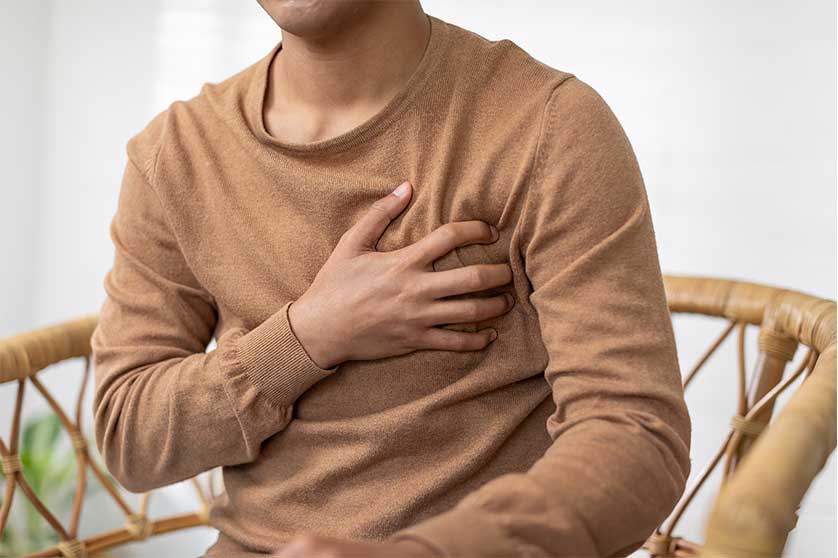Crack Overdose | Risk Factors, Signs, & Treatment

Medically Reviewed By: Manish Mishra, MBBS
A crack cocaine overdose can occur when you smoke or consume too much of the drug. Signs of a crack overdose include chest pain and difficulty breathing, and an overdose may require immediate medical attention.

Cocaine is a stimulant drug that comes in powder or rock form. While both may be referred to as cocaine, powder cocaine is typically the common name while the solid or rock form of the drug is known as crack cocaine.
Crack cocaine, sometimes known simply as crack, is a form of cocaine powder that has been combined with water and baking soda. Once this has taken place, the mixture is boiled until a solid substance is formed.
While the powder form is likely abused by snorting, the solid form is broken down for crack cocaine use and can be abused by smoking.
Smoking crack cocaine can lead to a number of health concerns, including a potential crack overdose. The side effects of crack cocaine can increase the risk of overdose, lead to a drug addiction, and cause life-threatening health problems even with first time use.
Crack Overdose Risk Factors
A number of risk factors are involved when it comes to abusing crack cocaine. Across Ohio, many residents may experience substance use disorder or crack cocaine addiction, which increases the risk of fatal overdose.
Smoking Large Amounts Of Crack
One of the primary risk factors of developing a crack cocaine overdose is taking large amounts of the drug. Crack cocaine is, according to the United States Drug Enforcement Administration (DEA), a Schedule II controlled substance which has a high potential for abuse.
Withdrawal symptoms of crack use can prove to be difficult and may result in using more crack to address discomfort. Those frequently participating in crack cocaine use or those who consume large quantities of the drug may be more susceptible to overdose.
Route Of Administration
Depending on the route of administration, crack cocaine can more easily cause an overdose. Those who combine the mixture with a liquid to inject the drug may experience the effects more quickly, while those who smoke the drug will also experience the effects, just not as fast.
Those who aren’t careful with the way the drug is administered run the risk of problems such as accidentally combining drugs or using too much cocaine that it creates an overdose.
Signs Of A Crack Cocaine Overdose
According to the National Institute on Drug Abuse (NIDA), some of the signs associated with a crack cocaine overdose include the following:
- high blood pressure
- difficulty breathing
- agitation
- heart rate fluctuations
- seizures
- severe paranoia
- anxiety
- chest pain
- restlessness
- stroke
- hallucinations
- high body temperature
- coma
Because cocaine affects the cardiovascular system, a drug overdose may result in cardiac arrest, a heart attack, or sudden death.
According to the Substance Abuse and Mental Health Services Administration (SAMHSA), crack cocaine is highly addictive and long-term heavy use can lead to potentially fatal symptoms.
Crack Overdose Treatment
If you believe a loved one is experiencing overdose symptoms, contact 911 and seek urgent medical attention. Once at the emergency department, emergency responders will help treat the patient.
After care in a hospital, doctors may recommend treatment for crack cocaine addiction.
Crack Addiction Treatment
Those who have developed a crack addiction will likely need to find a local Ohio treatment center to consider a program that best fits their needs.
Medical Detox
One of the first steps of treatment involves the detoxification process. Although this process is short-term, it allows your body to help rid itself of the unwanted toxins caused by the drug use.
Healthcare providers will monitor your progress during this time to assist you, provide medical advice, and watch your withdrawal symptoms closely.
Support Groups
Other treatment options come in the form of support groups. Throughout the Ohio area, there are countless 12-step programs and treatment opportunities.
Group therapy or specific, designated support groups like Cocaine Anonymous can help you and those struggling with similar addictions to find support with each other through shared experiences.
Inpatient Care
Those who wish for a more structured environment might want to consider an inpatient rehab. As an inpatient, you will have 24/7 access to medical professionals. It also helps provide a stable schedule and routine to help you on the road to recovery.
To learn about the inpatient treatment program at Ohio Recovery Center, please contact our helpline today.
- Department of Justice — What is Crack Cocaine? https://www.justice.gov/archive/ndic/pubs3/3978/3978p.pdf
- Drug Enforcement Administration — Cocaine https://www.deadiversion.usdoj.gov/drug_chem_info/cocaine.pdf
- National Institute on Drug Abuse — How is Cocaine Used? https://nida.nih.gov/publications/research-reports/cocaine/how-cocaine-used
- National Institute on Drug Abuse — What is Cocaine? https://nida.nih.gov/publications/drugfacts/cocaine
- National Library of Medicine: MedlinePlus — Cocaine Intoxication https://medlineplus.gov/ency/article/000946.htm
- Substance Abuse and Mental Health Services Administration — Know the Risks of Using Drugs https://www.samhsa.gov/adult-drug-use

